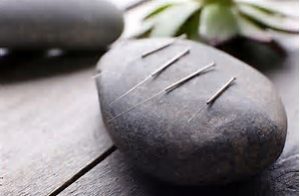Acupuncture
 Acupunture is one form of treatment under the umbrella of Traditional Chinese Medicine which has been used for over 5000 years and is the cornerstone of a civilization of nearly 1.4 billion people. Acupuncture is rooted in ancient Taoist philosophy which views a person as an energy system in which body and mind are unified, each influencing and balancing the other. Unlike allopathic medicine which attempts to isolate and separate a disease from a person, Chinese Medicine emphasizes a holistic approach that treats the whole body. We believe that Acupuncture, along with herbal and whole food therapy, massage, chiropractic, and overall nutrition are the key tools to wellness.
Acupunture is one form of treatment under the umbrella of Traditional Chinese Medicine which has been used for over 5000 years and is the cornerstone of a civilization of nearly 1.4 billion people. Acupuncture is rooted in ancient Taoist philosophy which views a person as an energy system in which body and mind are unified, each influencing and balancing the other. Unlike allopathic medicine which attempts to isolate and separate a disease from a person, Chinese Medicine emphasizes a holistic approach that treats the whole body. We believe that Acupuncture, along with herbal and whole food therapy, massage, chiropractic, and overall nutrition are the key tools to wellness.
The ancient Chinese believed that there is a universal life energy called Chi ( or Qi) present in every living creature. This energy is said to circulate throughout the body along specific pathways, called meridians, just below the surface of the skin. This energy works in harmony with the body’s circulatory, neurologic, muscular, digestive, urinary, hormonal/reproductive, respiratory, lymphatic, and emotional/limbic systems of the body. As long as this energy flows freely throughout the meridians, health is maintained, but once the flow of energy is blocked or weakened, the system is disrupted and pain and illness occur. Imagine rivers that flood and cause disasters or an electrical grid short-circuiting that causes blackouts. Acupuncture works to “re-program” and restore normal functions by stimulating certain points on the meridians (acupoints) in order to free up the Chi energy and restore harmony to the affected area.
The number of treatments and frequency of treatments required for a given patient to resolve his or her health concerns is dependent upon several factors. These include the nature and severity of the presenting condition and the length of time the condition has existed. Several of our patients will even continue to get acupuncture after their original health concern is resolved, simply to support overall balance and wellbeing within their body.
Acupuncture involves the placement of sterile, disposable needles that are rounded at the tip to allow for low-to-no pain during insertion, at select acupoints around the body to elicit a healing response from the body. Acupuncture effects the release of endorphins, neurochemicals produced in the body that are responsible for relaxation, mood-lifting, and pain reduction. Acupuncture has also been found to modulate nerve signals and correct the misfiring of nerves in an injured or diseased area. This enables proper communication with the brain and allows for the release of natural anti-inflammatory proteins and pain relieving enkephalins and endorphins. Promotion of proper blood flow is another positive effect of acupuncture, allowing for release of nitric oxide, leukotrienes, and anti-histamines to both dilate the blood vessels and reduce swelling, while bringing proper nutrition and oxygen to the damaged tissue for cellular repair and healing.
Dr. Brooke Frye has found Acupuncture to be specifically beneficial for her patients that struggle with fertility. She and Dr. Clinton Frye will often co-treat with Acupuncture and Nutrition/Supplementation in these cases. This treatment can be an option for patients looking for a more natural approach than conventional hormone-based IVF treatments or for support during such treatments. Many reproductive endocrinologists encourage their fertility patients to supplement their care with Acupuncture because of the high success rates. An often referenced study published in the April 2002 issue of Fertility & Sterility showed that Acupuncture helped over 40% of participants get pregnant during a round of IVF, compared to the 26% of pregnant patients who didn’t receive the therapy.
